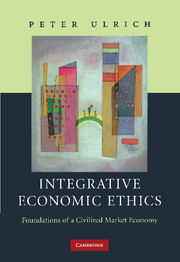Book contents
- Frontmatter
- Contents
- List of figures
- Preface
- Translator's note
- Introduction: orientation in economic-ethical thinking
- Part I Fundamental concepts of modern ethics and the approach of integrative economic ethics
- Part II Reflections on the foundations of economic ethics I: a critique of economism
- Part III Reflections on the foundations of economic ethics II: rational economic activity and the lifeworld
- Part IV A topology of economic ethics: the ‘sites’ of morality in economic life
- Bibliography
- Index of subjects
- Index of names
Part I - Fundamental concepts of modern ethics and the approach of integrative economic ethics
Published online by Cambridge University Press: 22 September 2009
- Frontmatter
- Contents
- List of figures
- Preface
- Translator's note
- Introduction: orientation in economic-ethical thinking
- Part I Fundamental concepts of modern ethics and the approach of integrative economic ethics
- Part II Reflections on the foundations of economic ethics I: a critique of economism
- Part III Reflections on the foundations of economic ethics II: rational economic activity and the lifeworld
- Part IV A topology of economic ethics: the ‘sites’ of morality in economic life
- Bibliography
- Index of subjects
- Index of names
Summary
The difficulties involved in meeting the requirements for a rational foundation of a modern ethics are considerable. On the one hand, the traditional mere declarations of belief in moral concepts based on religious or dogmatic convictions can no longer fulfil the expectations of an ‘ethics without metaphysics’ which can be justified by rational means alone. On the other hand, an ethical relativism is gaining ground – as a supposedly ‘postmodern’ reaction to the breakdown of traditional ‘fixed values’ and authoritative moral doctrines. This ethical relativism regards the rational foundation of moral obligations as impossible from the outset and virtually degrades moral issues to purely subjective questions of taste.
The main emphasis of the following introduction to a modern understanding of ethics is placed on the unfolding of a humanistic rational ethics that sees itself as a third way between dogmatism or fundamentalism on the one hand and relativism or scepticism on the other. As part of an enlightened ‘cultivation of reason’ it pursues reflection on the general normative preconditions of the good life and just social relations of free and self-determined persons, which can be reasonably understood by all men of ‘good will’.
We begin with the clarification of the phenomenon of human morality from the familiar perspective of those who have always participated in a moral community. The specifically modern idea of a rationally justifiable universal moral principle is already clearly present at this stage (Chapter 1).
- Type
- Chapter
- Information
- Integrative Economic EthicsFoundations of a Civilized Market Economy, pp. 11 - 12Publisher: Cambridge University PressPrint publication year: 2008



